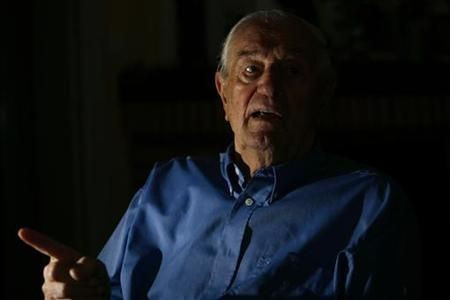Who Was Rochus Misch? Adolf Hitler’s Last Bodyguard Dies At 96

The last person to see Nazi dictator Adolf Hitler alive has died in Berlin at the age of 96. Rochus Misch, Der Fuhrer’s final bodyguard, remained a controversial figure because of his generally benevolent view of the man who was responsible for millions of deaths between 1933 and 1945. Burkhard Nachtigall, an author who helped Misch ghostwrite his memoir "The Last Witness," told the Associated Press that Misch died on Thursday following a short illness.
A former member of the feared Nazi paramilitary group Schutzstaffel (SS), Misch served as Hitler’s bodyguard for most of World War II. Misch reportedly manned the phones in the bunker in Berlin where Hitler spent his final hours before committing suicide along with his lover Eva Braun on April 30, 1945. Misch reportedly also witnessed the suicides of Nazi propaganda minister Josef Goebbels, his wife and all six of their children on the following day. Misch fled the bunker the day after, just hours before Russian Red Army troops arrived.
“[Hitler was] a very normal man ... he was no brute, he was no monster, he was no superman,'” Misch declared to AP in an interview from 2005. Indeed, Misch frequently referred to Hitler warmly as the “boss.” While he did not deny the Holocaust, Misch nonetheless could not reconcile the Hitler he knew with the atrocities the Nazi chief had ordered. "I cannot myself imagine Hitler as a murderer,” Misch said. “It is simply impossible. He was so friendly, so nice."
According to German media, Misch was born in Upper Silesia (now in Poland) in 1917 and eventually served as an SS soldier during the occupation of Austria in 1938 and the Sudetenland in 1939. He was asked by Hitler’s chief adjutant to serve as the leader’s bodyguard after he was severely wounded during the Wehrmacht’s ultimate victory in Poland. But Die Welt, a German newspaper, indicated that Misch did not formally serve as Hitler’s bodyguard -- that job was the responsibility of the "Reich Security Service.” Misch was more of an aide-de-camp, and did not enjoy a prominent role in Hitler’s organization and household.
Following Germany’s defeat in the war, Misch was captured by Soviet troops, leading to nine years of captivity in brutal Russian labor/prison camps, where he endured torture at the hands of Communists trying to determine Hitler’s true fate. After the Soviets released him in 1954, Misch returned to Berlin to run a painting and printing shop, and lived a rather anonymous existence in the suburb of Rudow. His wife died in 1998 and they had one daughter named Birgitta, who became estranged from her father.
In a 2005 interview with American author Ida Hattemer-Higgins that was published in Salon, Misch made the following comments:
On Hitler’s personality: “Hitler, to me, was always a completely normal person. He spoke completely normally to me. I lived together with him for five years. I only knew him as a wonderfully good boss, right? I could talk with him. He was always satisfied with us … He was never authoritarian. And we were with him day and night; we knew him. He was never without us, day and night. If he wanted something in the night, his servant was asleep, so he called one of us.”
On how he felt when he realized Hitler was dead: “We were expecting it. It didn’t come as a surprise. We were living in another world at that point. We had so many feelings, fear, hope -- I can’t describe it. We had habituated ourselves to the idea of the end. We had a feeling as if we were drunk. To put it bluntly, we didn’t give a damn, finally. Nothing made a hell of a lot of difference at that point.”
On neo-Nazis: “Ach, neo-Nazi. [There is] no such thing. What does ‘neo-Nazi’ mean? New Nazi, right? There aren’t any. That’s just a buzzword. What you have are nationally conscious people, people who say, ‘my fatherland, right or wrong.’ My fatherland, nothing more, am I right? [The] British say it, the Swiss say it, the Israelis say it -- ‘My country,’ they say. And I’ll fight for it. The Israelis are nationalistic people, they defend their region, they defend their people. They have as much right as anyone.”
On the U.S. military invasion of Iraq: “The whole Iraq war isn’t about Saddam Hussein; it’s about Israel. Israel can’t exist on avocados and oranges! A nation lives from business. They have to have money. And the Americans always pay in [to Israel]. This is just my opinion, but why did they occupy Iraq? Supposedly because of atomic bombs? In my opinion, Iraq is a wealthy oil region, and with this money they [U.S.] can support Israel. They [U.S.] can’t keep pumping their own money in forever.”
© Copyright IBTimes 2025. All rights reserved.





















